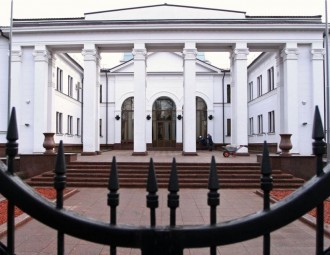Providing a place for talks, Belarus is bolstering its global position in ensuring regional security

And moreover, the Belarusan Foreign Ministry is likely to step up its activity in order to lift Western sanctions against the Belarusan leadership completely.
The Kremlin has de facto supported Belarus by insisting on holding the Normandy Four talks in Belarus’ capital whereas the Belarusan leadership was still subject to Western sanctions. Official Minsk is likely to increase pressure on the West to lift the sanctions against the Belarusan authorities and to obtain assistance from international financial institutions.
On February 11th – 12th, Minsk hosted 16-hour talks between the leaders of Ukraine, Russia, Germany and France. The Normandy Four talks resulted in a declaration in support of a package of measures to implement the Minsk agreements. On the same day the declaration was signed by the participants of the Trilateral Contact Group on Ukraine (Ukraine – Russia – OSCE) and Donbas separatists. The parties have agreed on ceasefire as of 12 am (Kyiv time) on February15th, withdrawal of foreign troops from the Ukrainian territory, withdrawal of heavy weapons within 14 days and release of hostages in five days, as well as unconditional access by Ukraine and her international partners to the affected areas in order to provide humanitarian assistance. Neither these talks, nor the previous ones had led to a peace agreement over eastern Ukraine albeit had somewhat relieved tension for a while.
Analysts have differently assessed the results of the Normandy Four talks in Minsk. Most however agreed that official Minsk, which provided a platform for negotiations, was the ultimate beneficiary of the meeting. The meeting of such a level with the participation of EU leaders was held in Minsk for the first time in Belarus’ modern history. In addition, amid the conflict in Ukraine, the Belarusan leadership has de facto managed to get around the European sanctions. The initiative to hold talks in Minsk belonged to President Putin, who asked his Belarusan counterpart to provide a platform for the high-level peace talks.
In addition, the Russian media and Russian audiences have praised the President Lukashenka’s peacekeeping role. The leading Russian TV channels underscored the positive role of President Lukashenka in the conflict resolution in Eastern Ukraine in their reports.
The president also gave a 15-minute interview to the Russian channels NTV and Russia 1. In the interview, the Belarusan leader reaffirmed his commitment to the Eurasian integration, and commented on his ‘rapprochement’ with the EU: “I would not say that we have somehow improved the relations with them. I do not cherish any hopes there. Frankly and honestly speaking, I would like to say that I am no longer in the age when people rush or make sharp turns and so on. I have seen enough of this. So that, you know, one feels dizzy ... In fact, why should I feel dizzy? Is it because I was asked to organise this event? Get real! I do not overestimate Belarus’ role or my own role in this, as usual. I am not exaggerating. So if you think that I would use this as an excuse to turn toward somewhere else, forget about it".
Prior to the Normandy Four talks, leaders of the self-proclaimed Lugansk and Donbas People’s Republics issued a statement in which they proposed to send CSTO peacekeeping forces in the region. Previously, President Lukashenka talked about the Belarusan peacekeeping troops’ participation in stabilising the situation in Eastern Ukraine. However, official Minsk is unlikely to go as far as putting this idea into action due to its extreme unpopularity among the population and a deep divide in Belarusan society over the conflict in Ukraine.
The Belarusan Foreign Ministry is likely to step up its activity in order to lift Western sanctions against the Belarusan leadership completely.
-
03.01
-
07.10
-
22.09
-
17.08
-
12.08
-
30.09








































